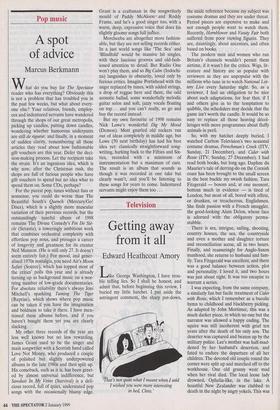Television
Getting away from it all
Edward Heathcoat Amory
Like George Washington, I have trou- ble telling lies. So I shall be honest, and admit that, before beginning this review, I buried my little hatchet. I put aside the astringent comment, the sharp put-down, hat's not quite what I meant when I said I wished you were more interesting in bed, Chris.' the snide reference because my subject was costume dramas and they are under threat. Period pieces are expensive to make and not enough people want to watch them. Recently, Hornblower and Vanity Fair both suffered from poor viewing figures. They are, dauntingly, about ancestors, and often based on books.
The modem men and women who run Britain's channels wouldn't permit them airtime, if it wasn't for the critics. Wigs, lit- erature and history are as popular with reviewers as they are unpopular with the millions who tune in to watch National Lot- tery Live every Saturday night. So, as a reviewer, I feel an obligation to be nice about such adaptations, for fear that, if I and others give in to the temptation to quibble, the schedulers may decide that the game isn't worth the candle. It would be so easy to replace all those heaving decol- letages with more programmes about fluffy animals in peril.
So, with my hatchet deeply buried, I watched Carlton Television's two seasonal costume dramas, Frenchman's Creek (ITV, Sunday, 21 December), and Cider with Rosie (ITV, Sunday, 27 December). I had read both books, but long ago. Daphne du Maurier's tale of derring-do on the Cornish coast has been brought to the small screen in the best buckle my swash fashion. Tara Fitzgerald — bosom and, at one moment, bottom much in evidence — is tired of London, but most of all, bored with effete, or drunken, or treacherous, Englishmen. She finds passion with a French smuggler, the good-looking Alain Delon, whose face is adorned with• the obligatory perma- stubble.
There is sex, intrigue, sailing, shooting, country houses, the sea, the countryside and even a mother and daughter torture and reconciliation scene, all in two hours. Finally, and reassuringly for Anglo-Saxon manhood, she returns to husband and fam- ily. Tara Fitzgerald was excellent, and there was a good balance between action, plot and personality. I loved it, and two hours was just about right. It was too escapist to warrant a series.
I was expecting, from the same company, a similarly fun but facile treatment of Cider with Rosie, which I remember as a bucolic hymn to childhood and blackberry picking. As adapted by John Mortimer, this was a much darker piece, in which no one but the narrator was allowed a happy ending. The squire was still incoherent with grief ten years after the death of his only son. The deserter was captured and beaten up by the military police. Lee's mother was half-mad- dened by her husband's desertion, and fated to endure the departure of all her children. The devoted old couple round the corner were split up and marched off to the workhouse. One old granny went mad when her rival died. The local loose lady drowned, Ophelia-like, in the lake. A boastful New Zealander was clubbed to death in the night by angry yokels. This was no pastoral paradise, but a sad, doomed dream.
I found it compelling, but depressing. The young Laurie Lee came across as a dull prig, vocally and emotionally with- drawn and inarticulate, an impression peri- odically reinforced by his older self as the self-consciously literary narrator. But the picture of country life between the wars was well drawn: Juliet Stevenson was excel- lent as the mother and a lightweight book had become heavyweight television. Per- haps Mr Mortimer had tried a little too hard to avoid saccharine sentimentalism, but his concern that the failings of feudal- ism should be exposed gave the drama an extra dimension.
My hatchet, as you see, stayed buried. These two programmes, both from the same genre, could not have been more dif- ferent, but both were first-class television. They also served as a reminder that my fix- ation with the costumes worn by the cast was a mistake. The punch packed by a pro- gramme has little to do with its period or its subject, but with the talent and commit- ment of those who made it. Carlton has been given a hard time for broadcasting the mendacious documentary, Connections. It deserves praise for these successful forays into unfashionable and expensive television territory.



























































 Previous page
Previous page